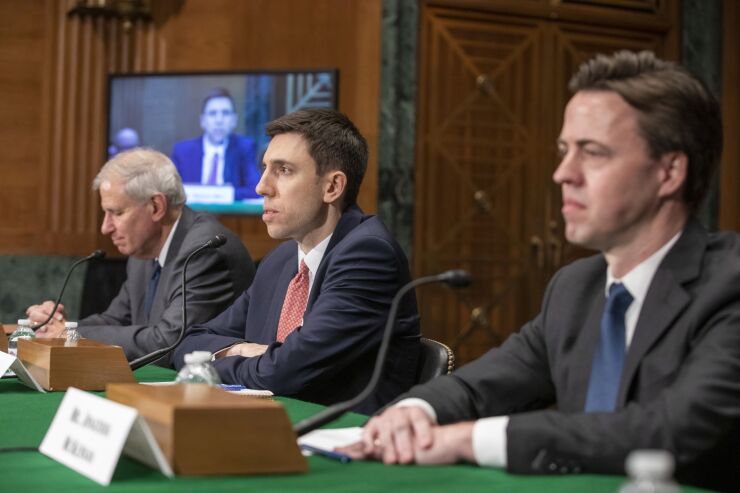
WASHINGTON — Amid a flurry of new rules brought forward by the Federal Deposit Insurance Corp. Tuesday, Consumer Financial Protection Bureau Director Rohit Chopra issued a proposal for comment to enable the FDIC to actively review the acquisition of shares in FDIC-supervised banks by large asset managers.
Chairman Martin Gruenberg supported the proposal, noting that the FDIC would more rigorously scrutinize arrangements with the banks it primarily supervises. Gruenberg also emphasized that the agency will seek ways to uphold collaboration between the banking agencies as it takes public comment on the proposal.
"I believe it is important that the FDIC, as the primary federal regulator of state non-member banks, closely reviews who is exercising direct or indirect control over its supervised institutions," said Gruenberg. "However, as I emphasized at the outset, the FDIC values and expects to continue its close collaboration with the Federal Reserve Board and the Office of the Comptroller of the Currency on matters related to changes in control affecting FDIC-supervised institutions and their respective holding companies."
Under the Change in Bank Control Act, transactions at the holding company level are typically reviewed by both the Federal Reserve and the primary banking supervisor — in this case the FDIC. However, in some cases, the FDIC has not required such notices when the Federal Reserve Board has accepted "passivity commitments" from an investor — a formal understanding that the acquiring entity will not exert managerial control over the firm it is buying shares in. While the FDIC's current regulations often defer to the Fed, Chopra's proposal would give the FDIC a more active role in reviewing asset manager's compliance with the Change in Bank Control Act.
The proposal also eliminates large investment funds' option to self-certify their control status over FDIC-regulated banks, instead directing examination staff to "analyze the ongoing interaction between an investor and the institution."
In April, the FDIC board reviewed two proposals addressing the control of banks by asset managers introduced by Chopra and FDIC Board Member Jonathan McKernan. McKernan's proposal called for enhanced monitoring of major index fund managers to ensure compliance with existing regulations, while Chopra's broader proposal aimed to reinstate FDIC oversight on acquisitions of voting securities at the holding company level.
In an
Living wills
The FDIC board also separately approved final guidance on bank resolution plans — contingency plans required for banks with assets greater than $250 billion, commonly known as living wills. These plans outline how the institution could be rapidly and orderly resolved in the event of failure, intended to minimize systemic risk and avoid government bailouts.
Tuesday's guidance would apply to the "triennial full filers," a group that includes the largest regional banks.
The guidance addresses living wills for both domestic and foreign banking organizations and was jointly developed by FDIC and Federal Reserve staff, following public comments on a
The guidance requires firms to develop actionable plans to ensure critical shared services, essential operations and business lines can continue in the event of distress. Additionally, firms are expected to conduct an abbreviated analysis demonstrating that their preferred resolution strategy is more cost effective than a payout liquidation. The guidance addresses how firms may plan to deal with offloading derivatives and trading activities, emphasizing the need for thorough documentation and reporting to assist in the winding down of the firm.
Information on deposits
Another agenda item from Tuesday's meeting was a board request for information on the stability and characteristics of different types of deposits. The RFI — supported unanimously by the board — aims to determine if more detailed reporting could enhance risk monitoring and warrant re-examination of what the FDIC charges firms for deposit insurance.
The request comes after runs on uninsured deposits contributed to the failures of Silicon Valley Bank, Signature Bank and First Republic Bank in 2023. The historic failures have brought a renewed focus on deposit insurance coverage and bank funding concentrations, and raised the need for more detailed data on uninsured deposits.
The FDIC board of directors approved the RFI's publication in the Federal Register, which will take comments from the public for 60 days following publication. The measure was relatively uncontroversial, with FDIC Vice Chair Travis Hill — one of two Republican members of the board — saying the information collected could be useful in informing any future reforms.
"I think regulators need to think more holistically about the deposit landscape than we do today, and I view this RFI as a small step in the right direction," said Hill. "In the long run, we should consider whether, how and to what extent to collect more granular and frequent deposit data, and I think asking for broad feedback before proposing specific Call Report changes is useful."





